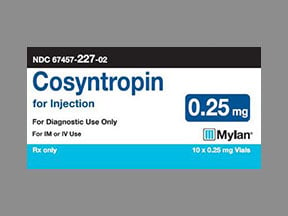
Cortrosyn Coupons & Savings Card – Discount Prices from $24.82
Brand for: Cosyntropin
My prescription
Edit
0.25MG, Cosyntropin (1 Solution Reconstituted)
Select pharmacy

CVS
$81.94
COUPON PRICE
Albertsons
$24.82
COUPON PRICE
Walgreens
$32.44
COUPON PRICE
Walmart
$72.00
COUPON PRICECortrosyn savings card
Show this card to your pharmacist
Albertsons
$24.82
BIN
ID
PCN
GRP
019876
LH3321865C
CHIPPO
LHX
Powered by
Price history for Cortrosyn (brand) & Cosyntropin (generic)
1 Solution Reconstituted, 0.25MG
Average retail price for Cortrosyn
Average retail price for Cosyntropin
Average SaveHealth price for Cosyntropin
Our price history data is based on aggregated prescription data collected from participating pharmacies in America. Our prescription data updates daily to reflect the latest price changes. If you notice a missing data point, it means there wasn't sufficient data available to generate a monetary value for that date.
Over the last 12 months, the average discount price of Cortrosyn is $54.34 using the SaveHealth savings card. That's an average savings of 64.48% on Cortrosyn with our discount card.
*Retail prices are based on pharmacy claims data, and may not be accurate when we don't have enough claims.
Cortrosyn (Cosyntropin) dosage forms
Dosage Quantity Price from Per unit 0.25MG 1 Solution Reconstituted $24.82 $24.82 0.25MG 10 Solution Reconstituteds $180.73 $18.07
| Dosage | Quantity | Price from | Per unit |
|---|---|---|---|
| 0.25MG | 1 Solution Reconstituted | $24.82 | $24.82 |
| 0.25MG | 10 Solution Reconstituteds | $180.73 | $18.07 |
What is the drug CORTROSYN used for?
CORTROSYN is used as a diagnostic agent to assess adrenal gland function. It is typically administered during an ACTH stimulation test to evaluate how well the adrenal glands respond by producing cortisol.
Is cosyntropin a steroid?
Cosyntropin is not a steroid. It is a synthetic form of adrenocorticotropic hormone (ACTH) used primarily in diagnostic testing to assess adrenal gland function.
What is CORTROSYN used for in dogs?
CORTROSYN is used in dogs to perform an adrenocorticotropic hormone (ACTH) stimulation test. This test helps diagnose conditions related to adrenal gland function, such as Addison's disease (hypoadrenocorticism) or Cushing's disease (hyperadrenocorticism).
Does cosyntropin increase cortisol?
Yes, cosyntropin is used to stimulate the adrenal glands to produce cortisol. It is often used in diagnostic testing to assess adrenal function.
What is the generic name for CORTROSYN?
The generic name for CORTROSYN is cosyntropin.
